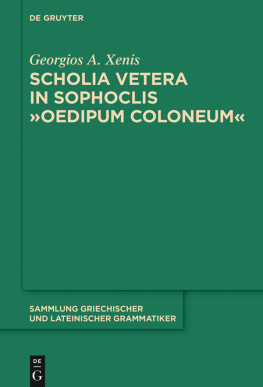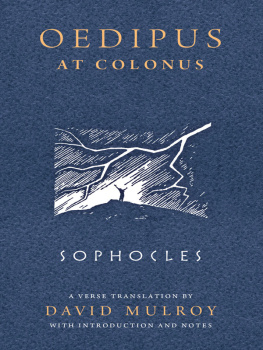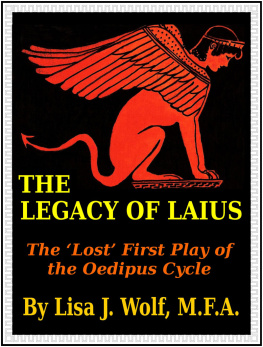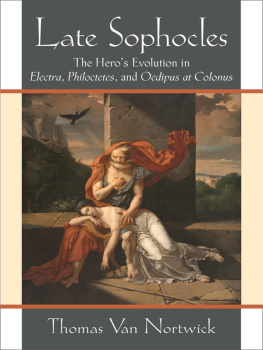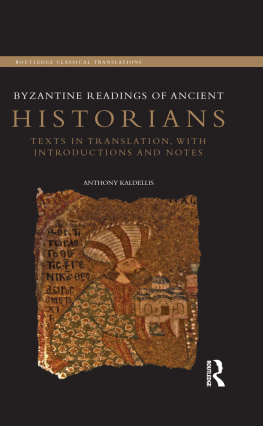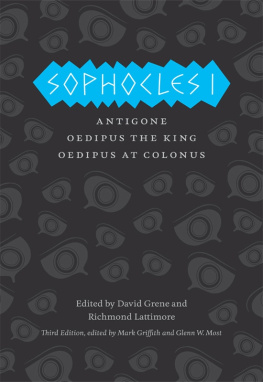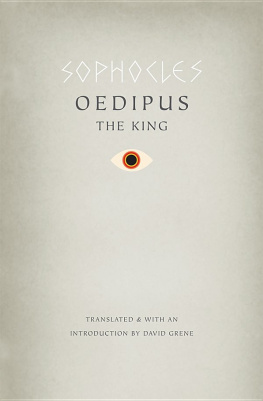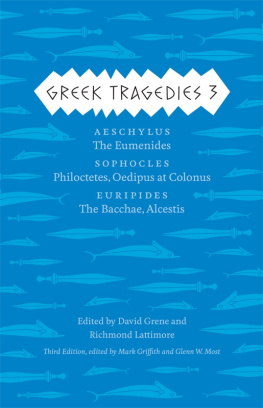Contents
Guide

Scholia vetera in Sophoclis Oedipum Coloneum
Sammlung griechischer und lateinischer Grammatiker (SGLG)
Herausgegeben von
Klaus Alpers Ian C. Cunningham
Band 18
De Gruyter
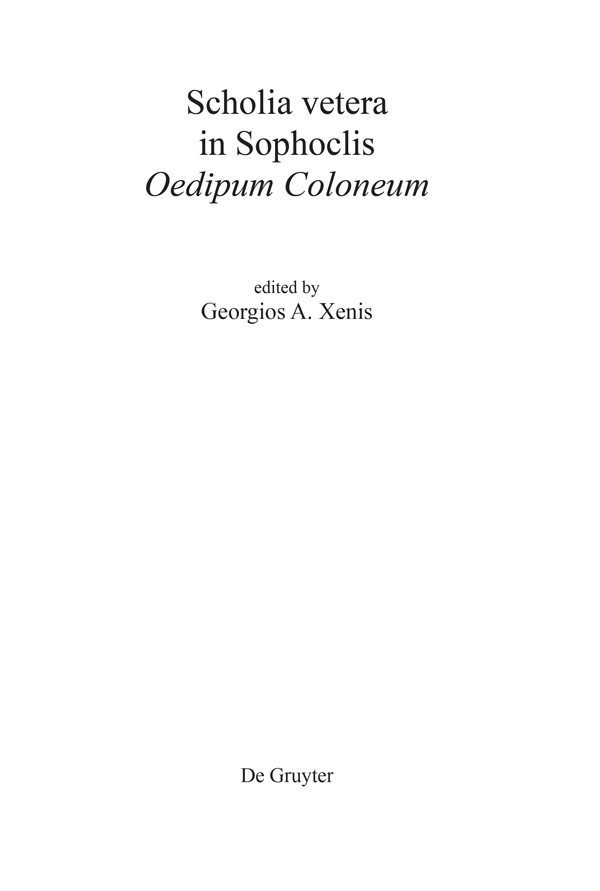
ISBN 978-3-11-044733-0
e-ISBN (PDF) 978-3-11-045732-2
e-ISBN (EPUB) 978-3-11-045604-2
ISSN 1862-2372
Library of Congress Cataloging-in-Publication Data
A CIP catalogue record for this book has been applied for at the Library of Congress.
Bibliografische Information der Deutschen Nationalbibliothek
Die Deutsche Nationalbibliothek verzeichnet diese Publikation in der Deutschen Nationalbibliografie; detaillierte bibliografische Daten sind im Internet ber http://dnb.dnb.de abrufbar.
2018 Walter de Gruyter GmbH, Berlin/Boston
www.degruyter.com
G E O R G I O A . C H R I S T O D O U L O U
P R A E C E P T O R I A M I C O C O L L E G A E
D . D . D .
E D I T O R
Preface and Acknowledgements
This is the third volume of what is projected to be a new edition of the scholia vetera to all seven of Sophocles surviving complete tragedies. It is my purpose in this volume, as it was in its predecessors, the scholia vetera to Electra and Trachiniae , to restore the scholia vetera to Oedipus Coloneus in their earliest recoverable version and corpus. This statement contains a number of key terms that are not explained here. What is a version, what does it tell us about the nature of the transmission of scholia in general, and what are its implications for the editor? What exactly do the earliest recoverable version and corpus represent, and why is it desirable to seek to establish these rather than other ones? By what methods can we gain access to this earliest version and corpus? These questions as well as the principles that guide me in the constitution of the text are fundamental for a proper understanding of the character of this edition, but are thoroughly dealt with in the Introduction of the Electra volume, and more specifically in the sections on Editing Scholia: Methodological considerations and the scope of the present edition, and on The present edition. Likewise, I do not repeat the description of the manuscripts and most of the previous editions nor do I outline again the distinguishing features of each of the four versions in which the scholia vetera to Oedipus Coloneus have come down to us: the Laurentian and Roman versions are described in the Electra volume, whereas the Triclinian and the a versions are described in the Trachiniae volume. What the Introduction of the present volume does is to focus on issues that are specific to the new text: it engages with the affiliation among the manuscripts of each version, the indirect tradition, and most importantly, the last edition prepared by Vittorio De Marco in 1952, and offers supplementary material on the editio princeps by Janus Lascaris.
It is a delightful task to acknowledge the debts I have incurred in preparing this work. I have benefitted greatly from the support of two institutions. The A.G. Leventis Foundation generously funded my work for more than two years, thus supporting the appointment of a research assistant. The University of Cyprus awarded several grants, which covered the expenses of my research trips to Oxford, Venice and Leiden. It also granted a sabbatical in 2016, which enabled me to advance my edition substantially.
I have also benefitted from the encouragement and help of several colleagues and friends. Klaus Alpers and Ian C. Cunningham, the editors of SGLG, have always encouraged me in all my academic work and, in particular, have fostered my project on the Sophoclean scholia since its inception seven years ago. Robert Parker supplied information on several questions related to religious practices mentioned in the text. Georgi Parpulov translated a Russian article by Tadeusz Zieliski. Enrico Magnelli, Paolo Scattolin, Timothy Janz, Stephanie Roussou, Chrysanthos Chrysanthou and Stefano Vecchiato helped in finding bibliographical items. Rodia Rousou, my research assistant, was involved in a variety of tasks, in which she provided invaluable help. At the press, Katrin Hofmann and Florian Ruppenstein were, as always, very friendly and very efficient. George A. Christodoulou kindly discussed several passages of this text with me and put a number of his unpublished conjectures at my disposal. The dedication of the book to him is a recognition not only of the major role he has played in my academic formation, since the beginning of my PhD two decades ago, but also of the fact that for all these years he has served as a model of one of the finest things in life, true friendship: , .
University of Cyprus, Nicosia
Georgios A. Xenis
November 2017
Sources and Bibliography
Sources
| Ael. D. | Aelii Dionysii atticistae fragmenta, ed. H. Erbse, in: Untersuchungen zu den attizistischen Lexica, Berlin 1950, 95151 |
| Amm. | Ammonii qui dicitur liber de adfinium vocabulorum differentia, ed. K. Nickau, Lipsiae 1966 |
| Apion L. | A. Ludwich, ber die Homerische Glossen Apions, Philologus 74 (1917) 20547; 75 (1918) 95127 (= LGM 283358) |
| Apion N. | Apions , ed. von S. Neitzel, SGLG 3, Berlin New York 1977, 185328 |
| Ap. Soph. | Apollonii Sophistae Lexicon Homericum , ed. I. Bekker, Berolini 1833 |
| Ap. Dysc. pron . | , ed. R. Schneider, in Grammatici Graeci II.I.1, Lipsiae 1878, 3116 |
| [Arcad.] | [Arcadii], , ed. M. Schmidt, Ienae 1860 |
| Choer. I | Georgii Choerobosci Prolegomena et scholia in Theodosii Alexandrini Canones isagogicos de flexione nominum , ed. A. Hilgard, Lipsiae 1894, 103417 |
| Choer. Ep. Ps . | Georgii Choerobosci Epimerismi in Psalmos e codice manuscripto bibl. Reg. Paris., tom. III, ed. T. Gaisford, Oxonii 1842, 1193 |
| Comanus | The Fragments of Comanus of Naucratis , ed. A.R. Dyck, in: F. Montanari, I frammenti dei grammatici Agathokles, Hellanikos, Ptolemaios Epithetes , D.L. Blank, Lesbonax , A.R. Dyck, The Fragments of Comanus of Naucratis , SGLG 7, Berlin New York 1988 |
| D. Thr. | Dionysii Thracis Ars grammatica , ed. G. Uhlig, in Grammatici Graeci I.1, Lipsiae 1883, 3101 |
| EM | Etymologicum Magnum Auctum , 1 384 ( ), vol. III, ed. F. Lasserre N. Livadaras, Romae 1976 / Athenis 1992; rest in Etymologicum Magnum , ed. Th. Gaisford, Oxonii 1848 |
| Ep. Hom. | Epimerismi Homerici , ed. A.R. Dyck, pars altera, Berlin New York 1995 |
| Erot. | Erotiani Vocum Hippocraticarum collectio cum fragmentis , ed. E. Nachmanson, Upsaliae 1918 |
| Et. Gen. | Etymologicum Magnum Genuinum , Symeonis Etymologicum una cum Magna Grammatica , Etymologicum Magnum Auctum , ed. F. Lasserre et N. Livadaras, vol. I ( ), Romae 1976; vol. II ( ), thenis 1992 |
| Et. Gud. Stef. | Etymologicum Gudianum , fasc. 12, ed. A. de Stefani ( ), Lipsiae 190920; rest in: Etymologicum Graecae linguae Gudianum , ed. F. G. Sturz, Lipsiae 1818 |
| Et. Sym. | Symeonis Etymologicum una cum Magna Grammatica , 1 273 (), vol. III, ed. F. Lasserre N. Livadaras, Romae 1976 / Athenis 1992 |
| Eust. Il . | Eustathii Archiepiscopi Thessalonicensis, Commentarii ad Homeri Iliadem pertinentes , ed. M. van der Valk, vol. IIV, Lugduni Batavorum 197187 |

